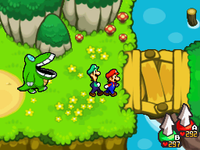Crawful
| Bowser's Inside Story + Bowser Jr's Journey enemy | |||||||||||||||||||
|---|---|---|---|---|---|---|---|---|---|---|---|---|---|---|---|---|---|---|---|
| Crawful | |||||||||||||||||||

| |||||||||||||||||||
| Location(s) | Blubble Lake | ||||||||||||||||||
| Level | 15 | ||||||||||||||||||
| HP | 173 | ||||||||||||||||||
| POW | 180 | ||||||||||||||||||
| DEF | 84 | ||||||||||||||||||
| SPEED | 50 | ||||||||||||||||||
| Experience | 170 | ||||||||||||||||||
| Coins | 45 | ||||||||||||||||||
| Item drop | Fiery Drumstick - 30% Excellent Ring - 20% | ||||||||||||||||||
| |||||||||||||||||||
| Bowser's Inside Story enemy | |||
|---|---|---|---|
| Crawful | |||

| |||
| Location(s) | Blubble Lake | ||
| Battled by | Anyone | ||
| Role | Common | ||
| Level | 25 | ||
| HP | 173 (260) | ||
| POW | 149 (373) | ||
| DEF | 85 (128) | ||
| SPEED | 59 (89) | ||
| Fire | Half | ||
| Burn? | Normal | ||
| Dizzy? | Normal | ||
| Stat down? | Normal | ||
| KO? | Normal | ||
| Experience | 170 | ||
| Coins | 45 (68) | ||
| Item drop | TNT Drumstick - 5% Excellent Ring - 20% | ||
| |||
A Crawful is a crocodilian enemy who stands on two feet and possesses Fawful's glasses and teeth. They are encountered above ground and underwater in Blubble Lake in the game Mario & Luigi: Bowser's Inside Story. In the overworld, they will start the battle by chasing the player while gnashing their teeth. During battle, they use objects to attack. When a Crawful uses a banana peel, it will slide into the player, causing damage. Alternatively, they can attack by tripping over a rock, creating a shockwave. If Bowser manages to hit the enemy while tripping over the rock, it will smack into another foe (unless there are no other foes), causing both of them damage. If Bowser does not hit the Crawful, the shockwave may also give Bowser the Trip status and flip Bowser on his shell unless he is doing a shell defense. Crawfuls can also eat a large bean to recover 60 HP.
If Bowser uses the Vacuum Block on this enemy, the Crawful's teeth will be sucked away and consumed by Bowser (boosting his defense). After this, the Crawful's power and defense are reduced and when it tries to eat a bean, the item pops back out from between the reptile's toothless gums. The bean then flies across the screen and disappears, eventually coming back on the other side of screen and hitting the Crawful, making it dizzy for four turns.
Mario and Luigi can also fight these large reptiles when they travel through Blubble Lake. While their tactics are the same, since Mario and Luigi can not remove their teeth, the Crawful will always be able to restore health with its bean. However, each of its attacks have to be dodged differently by the bros. When it goes to trip over a rock, Mario and Luigi must note where the Crawful is at. If its near a bro, that bro. must jump first to avoid the shockwave, then the next. If it is at the middle, the Bros. have to jump at the same time. When the Crawful attempts to trip on a banana peel towards a bro., the player needs to check which brother the Crawful is near, and have them counter it with the Hammer.
They also appear in the battle with the Tower of Yikk, where they throw a Fawful bomb at Bowser. He must punch the bomb and aim for the body of the tower. Crawfuls are the only enemies found underwater in Blubble Lake.
Bowser can use the Vacuum Block to inhale a Blitty from Crawfuls.
In Mario & Luigi: Bowser's Inside Story + Bowser Jr.'s Journey, they no longer chase Mario and Luigi in the overworld, and only one Crawful can be encountered if they battle them. They are additionally are found as enemies in the Bowser Jr.'s Journey mode.
Names in other languages
| Language | Name | Meaning |
|---|---|---|
| Japanese | ゲタゲター Getagetā |
From Gerakobittsu, Fawful's Japanese name, and English "alligator". |
| German | Krankodil |
From Fawful's German name, Krankfried and Krokodil, meaning crocodile. |
| Italian | Coccoghigno |
From Fawful's Italian name, Sogghigno, and Coccodrillo, meaning crocodile. |
| Spanish (NOA) | Crawful |
Crawful |
| Spanish (NOE) | Crócovitz |
From Fawful's Spanish (European) name, Grácovitz and Cocodrilo, meaning crocodile. |
